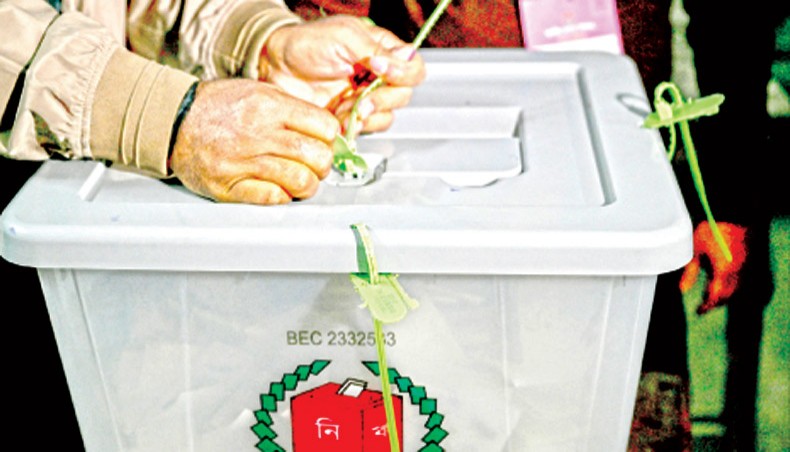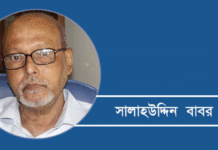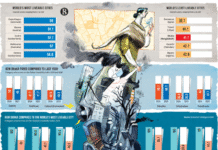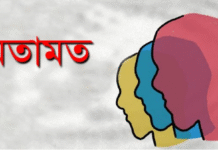
An election official seals a ballot box after voting at a polling station in Dhaka on January
Monwarul Islam : A FARCE of an election was held on January 7, where the results were already known. The futility of the election was clear to the naked eye as it was boycotted by all meaningful opposition parties, especially the Bangladesh Nationalist Party, the largest in the opposition camp. It was a futile exercise to give legitimacy to the ruling Awami League, which is now set to preside over the government for the fourth consecutive tenure. The election is, however, highly unlikely to give legitimacy to the Awami League although the party might not be disturbed by the legitimacy crisis as it had remained unperturbed after the 2014 and 2018 controversial elections.
The 12th national election not only insulted the little man, who, as Winston Churchill beautifully wrote, by making a little cross on a little bit of paper, make democracy meaningful but appears to have disempowered him completely.
The country saw another non-participatory, non-inclusive and managed ‘national election’ and it dealt a definitive blow to democracy. After the 2014 and 2018 elections and a democratic backslide that has eroded people’s confidence in the government and state institutions, it was expected by people at large at home and abroad and international organisations that the political parties, especially the Awami League and the Bangladesh Nationalist Party, would come to a negotiation to make free and fair election possible to take the country back in the right direction. But the unwillingness and high-handedness of the Awami League, which went for a pre-election crackdown and used legal and judicial systems to weaken the opposition, made it impossible and kept the opposition outside the electoral process.
Since October 28, more than 22,000 BNP leaders and activists have been arrested on what appear to be fabricated charges. In many cases, law enforcement agencies have detained politically innocent parents, children, or even wives of opposition activists, mostly accused in framed criminal cases and unavailable for arrest.
That these arrests were done to keep the opposition out of the electoral fray and intimidate them was clear from a remark of Muhammad Abdur Razzaque, an Awami League presidium member who is also the agriculture minister, that he made in an interview with a private television channel on December 17. The minister said that the Awami League had always had a plan to detain BNP leaders and activists before the elections as they could go for tough strike and movements to press their demand for the resignation of the government and the conduction of the national elections under a neutral government. The content of the minister’s comment also lays bare the pathetic state of the judiciary. The minister said that his party had tried to convince the Bangladesh Nationalist Party, out of the electoral fray of January 7, to join the elections by offering an overnight release of all BNP leaders and activists, which only gives credence to the public perception that all the arrests and convictions were made on framed cases for political reasons.
The minister’s remark is, in fact, a clear suggestion that the ruling party has made a naked use of the law enforcement agencies and the judiciary to harass the opposition and muzzle the dissent. It also reveals what has for long been in public perception that the ruling party has engineered an unprecedented democratic backslide and has used state agencies for political gains. Besides wholesale arrests, at least 1,243 BNP activists, accused of various ‘criminal offences’ for taking part in the movement for free, fair and inclusive elections, have already been convicted by courts, based, in most cases, on the witnesses of the partisan police that framed the criminal cases.
The January 7 election will, therefore, lack legitimacy. It was, contrary to the government’s claim, unrepresentative of the people’s will. The election was, first and foremost, characterised by a very low voter turnout. While the Election Commission claims that about 40 per cent of votes were cast, independent observers and the media have genuine reasons to doubt the figure. Media and independent observers reported empty polling centres all day long, which suggested that no more than 10–15 per cent of voters went to polling centres. In a number of polling centres, not a single vote was cast.
Even the Election Commission’s claim came as a surprise as the commission at 3:00pm said 27.15 per cent of the votes were cast. It beats logic that another 13 per cent voters turned up at the polling centres in just one hour in the winter afternoon and, that too, amidst a general strike by the boycotting opposition camp. It also needs to be noted that in the election, where AL-nominated candidates and AL-approved independents largely fought, the polls were characterised by rigging and violence. Incidents of casting fake votes were reported in many polling centres, which led the law enforcers to arrest 42 people, while three people were killed and scores of others were injured in clashes between activists of the Awami League and its independents, or Jatiya Party candidates. At least, 44 candidates in different constituencies boycotted the election on the day, bringing allegations, including vote rigging and irregularities in the polls, while the Jatiya Party chair termed the election a ‘managed affair’ and, therefore, unacceptable.
The Election Commission, however, claims that the election was free and fair. The few foreign observers, who mostly came as invited guests and used government facilities and enjoyed government patronisation, echo the commission’s baseless claim.
For the Awami League, it is a much-wanted victory and an extension of its tenure as the party’s nominated candidates and party-enabled independents have won 95 per cent of the seats while the Jatiya Party, the ‘domesticated opposition’ which went to the polls after negotiations with the Awami League, has won only 11 seats. The Awami League appears confident that no big challenge is forthcoming from any quarters and that it will do away with criticism and even sanctions.
What, however, appears to be troubling the Awami League is the intra-party conflicts that already surfaced during the election — about a dozen of its activists were killed and scores were injured during and before the elections when supporters of party-nominated candidates and party-enabled independents clashed — and is likely to continue and the international response.
The international response will not be as simple as the Awami League might like to see. When countries such as China, India and Russia have predictably welcomed the Awami League for its win in the election, western nations, including the United States, the United Kingdom, and the United Nations have raised concern and termed the elections flawed. It is not yet known whether the countries would take any tougher action. If they do, the Awami League might find itself in a difficult situation, especially when the economy in a shaky state.
A one-sided election, as this election has been termed at home and abroad, is a big disservice to democracy and it tarnishes Bangladesh’s image and weakens its footing in the world. Moreover, it further erodes the protective power of democracy, without which political, economic and social ills are hardly likely to be cured. The peril and consequences of the one-sided election will be disastrous for the country. With the parliament filled with members of one party and a dumbed-down opposition, the country, de facto, enters into a one-party system.
Dissatisfaction in the opposition camp and among the people, where silence now prevails, will, meanwhile, continue to grow before it explodes in the future. For that, the opposition, especially the Bangladesh Nationalist Party, will need to adopt more creative strategies and strengthen its movement for democracy. A one-point demand is unlikely to suffice. The opposition will need to emphasise the reforms it envisions and give voice to people’s concerns.
Monwarul Islam is an assistant editor at New Age.
New Age









